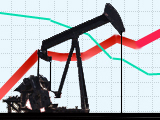Today.Az » Business » Oil slumps below $60
25 September 2006 [09:20] - Today.Az
Oil prices fell to a six-month low under $60 a barrel on Monday as BP's move to restore output at Prudhoe Bay earlier than expected added to a sense of healthy, secure supplies, while demand growth questions loomed large.

U.S. light, sweet crude for November was down 57 cents at $59.98 by 0146 GMT. Although prices were reported last week to have fallen to $59.80 a barrel on September 20, detailed data from the New York Mercantile Exchange showed a session low of $60.00, indicating the exchange may have revised the intra-day low. Oil has slumped by more than $17 since early August, its biggest decline in over 15 years, amid easing concerns over Iran and an unexpectedly mild hurricane season. The rout deepened last week as U.S. crude and fuel stocks remained robust, speculators grew anxious over slowing economic growth in the world's top consumer and hedge fund Amaranth Advisors registered billions of dollars in losses. "Concerns over economic slowdown and uncertainty surrounding the potential liquidation of trading positions following significant losses in recent days generated further downward pressure on prices (last) week," Goldman Sachs said in a report. Late on Friday BP said it would restore most of its shut-in output at the Prudhoe Bay oilfield in Alaska this week -- ahead of a previous target of end-October -- after getting clearance from U.S. pipeline regulators. The oil major will add 150,000 barrels per day (bpd) of output within the next week, a spokesman said, lifting total production to 400,000 bpd less than two months after it was forced to halve flows due to a corroded line. Prudhoe Bay is North America's biggest field, representing about 8 percent of U.S. output. Prices have been under mounting pressure as inventories of distillates climb to their highest in nearly eight years and natural gas stocks swell to record-high levels for this time of year, assuring consumers of winter fuel supplies. At the same time investors have begun to fret over the pace of U.S. economic growth, a worry heightened last week after a key business activity index turned negative for the first time since April 2003, indicating a decline in manufacturing. Economists now say the economy -- plagued by stubbornly high inflation -- is likely to be in a holding pattern for years amid uncertainty over whether higher interest rates are needed to curb price pressures -- or lower rates to buffer growth. Meanwhile geopolitical worries remained on the backburner, with major powers at the United Nations still trying to reach consensus over sanctions on Iran, the world's fourth-largest oil exporter. Iran's chief nuclear negotiator, Ali Larijani, and EU foreign policy chief Javier Solana are due to meet in an unspecified European city this week. Goldman cautioned that the market's weakness may be fleeting, as a severe winter could erode comfortable inventories while delays to new oilfields and refineries may put renewed strain on global capacity by the end of this year or in 2007. Even those who say the market may struggle to rebound warn that further losses are likely to be soon checked by members of the Organization of the Petroleum Exporting Countries (OPEC), many of whom say $50-$60 is where prices should be. Saudi Oil Minister Ali al Naimi last week said prices were "reasonable", a rhetorical shift from calling prices "high" that some analysts read as a warning sign for potential output action. Reuters
|